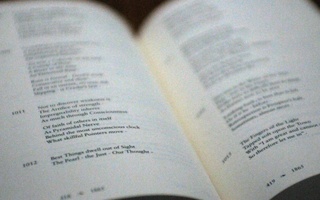{shortcode-5fa86d3b83054a40700a18e3a1f60ff94eca8be0}
Cassandra E. Euphrat Weston ’14 is alternately ecstatic and remarkably calm as she sits in Café Gato Rojo and recounts the origins of Speak Out Loud, the Harvard slam poetry collective she co-founded as a freshman three years ago. “It was the first year with a formal Wintersession—the first year of ‘You come back to campus, we’ll give you money to start student programs,’” she says, theatrically mimicking the gruff tones of an imagined uptight Harvardian On High.
Much of the initial impetus in creating SOL was to offer an alternative to the more intense entry processes of other Harvard arts groups. “So many of the activities and creative outlets were based on competition—I mean, comp sounds like competition right?” Euphrat Weston says. “We wanted to make Speak Out Loud a community where, above all, there were no entry requirements.”
As the group grew, however, the non-hierarchical and relaxed environment of SOL was countered by a desire to slam with other collectives. But both Euphrat Weston and the rest of SOL’s members are acutely aware of the potentially contradictory nature of attempting to create personal and nuanced work while also aiming to please a diverse audience. “Everyone who does slam knows that it’s broken—that it’s a game and it’s imperfect,” Euphrat Weston admits. SOL’s diverse ways of rationalizing the tension between the confessional and the competitive reflects how the spoken word community at large continues to grapple with the paradoxical nature of the slam format. Reconciling the competitive aspects of slam poetry with the artistic aspirations of spoken word poetry is difficult, but according to the poets of SOL, not impossible.
{shortcode-1f742c88c5091b8524ca3fa185c4ec8ace6343b2}
WHY SLAM?
Euphrat Weston is careful to underline the distinction between spoken word poetry, an art form based on the presentation of honest, candid, and often technically experimental work, and slam poetry, a scored face-off between a group of spoken word poets. SOL certainly didn’t gravitate towards slam in the hopes of boosting turnout. In fact, despite never having led a spoken word workshop before starting SOL, Euphrat Weston says the first workshop she planned with co-founder Kyra A. Atekwana ’14 “went better than we could have imagined.”
Slam, however, brings with it other irresistible perks. Euphrat Weston sees the draw towards spoken word competition primarily as an impetus for spoken word poets to produce higher quality poetry. “People want to have something really polished,” she says. Moreover, slam offered the best avenue to formally enter the national and local spoken word communities. These tempting impetuses caused the group to begin to transition away from the inherently introspective activity of creating art and towards the confusing and provocative world of trial-by-audience.
After a momentary pause, Euphrat Weston shrugs and quickly offers another reason for becoming involved in slam: so SOL can go to CUPSI. CUPSI, or the College Unions Poetry Slam Invitational, is a renowned yearly national college slam competition. This year, Speak Out Loud is sending five of its poets, including Euphrat Weston, to represent Harvard in Boulder, Colo. When the poets go to CUPSI, each will bring along distinct and developed opinions about how to resolve the inherent conflict in creating art for the purpose of competition.
COMPETITION FOSTERING COMMUNITY
George V. Watsky, almost a year removed from his second studio album, “Cardboard Castles,” which shot up to number one on the iTunes hip-hop/rap charts last March, took a break from his marathonic recording sessions for his follow-up record to talk via phone about the role of audience and community in his journey to artistic recognition. Watsky, a San Francisco native who was involved with CUPSI and the spoken word organization Youth Speaks, first received attention for the slam poetry he presented to much success in national slams and on YouTube. Watsky quickly rattles off an impressively informed history of spoken word that suggests the art is predicated on the existence of slam as a means of networking and visibility. “It’s hard to separate spoken word from slam poetry because the whole spoken word community blossomed around slam competitions,” he says.
Watsky, who believes that the popularity of slam was integral to his own transformation from spoken word artist to best-selling rapper, cites the influence of spoken word on “Def Poetry Jam.” The HBO series, hosted by hip-hop magnate Russell Simmons, brought the art form to a large group of young people during its run from 2002 to 2007. Watsky believes that main point of the competitive aspect of slam is to increase awareness about slam and thereby inspire further artistic innovation. “I’m not really a rule stickler. I don’t care enough about the competition to be worried about honing the rules of slam,” Watsky says. “Slam is great because it allows people to find out about the art form.”
Read more in Arts
Chaos and HarmonyRecommended Articles
-
Komunyakaa Creates Bizarre, Beautiful World in ‘Couch’Some poets perform an act of creation that supersedes the poem as a mere vessel for thought or emotion. Instead, ...
-
 On Poetry
On Poetry -
Barker Center Hosts National Latino/a Poetry Now EventCorral and fellow poets Rosa Alcalá and Aracelis Girmay were the featured speakers at the inaugural Latino/a Poetry Now event held Tuesday night at the Barker Center.
-
 Harvard Poets Celebrated for Arts First
Harvard Poets Celebrated for Arts First -
Poetasters and Poet-Masters: Slam Night at the Cantab LoungeLast Wednesday at the Cantab Lounge’s weekly poetry slam open mic, no one snapped and hardly anyone wore black.
-
Poetry Reading at Houghton to Focus on EcologyThe nearly 600-page collection features formally innovative work in the tradition of the pastoral, an ancient form of lyric poetry celebrating shepherds and rural life. At the same time, these poems address ideas from an ecology perspective.













